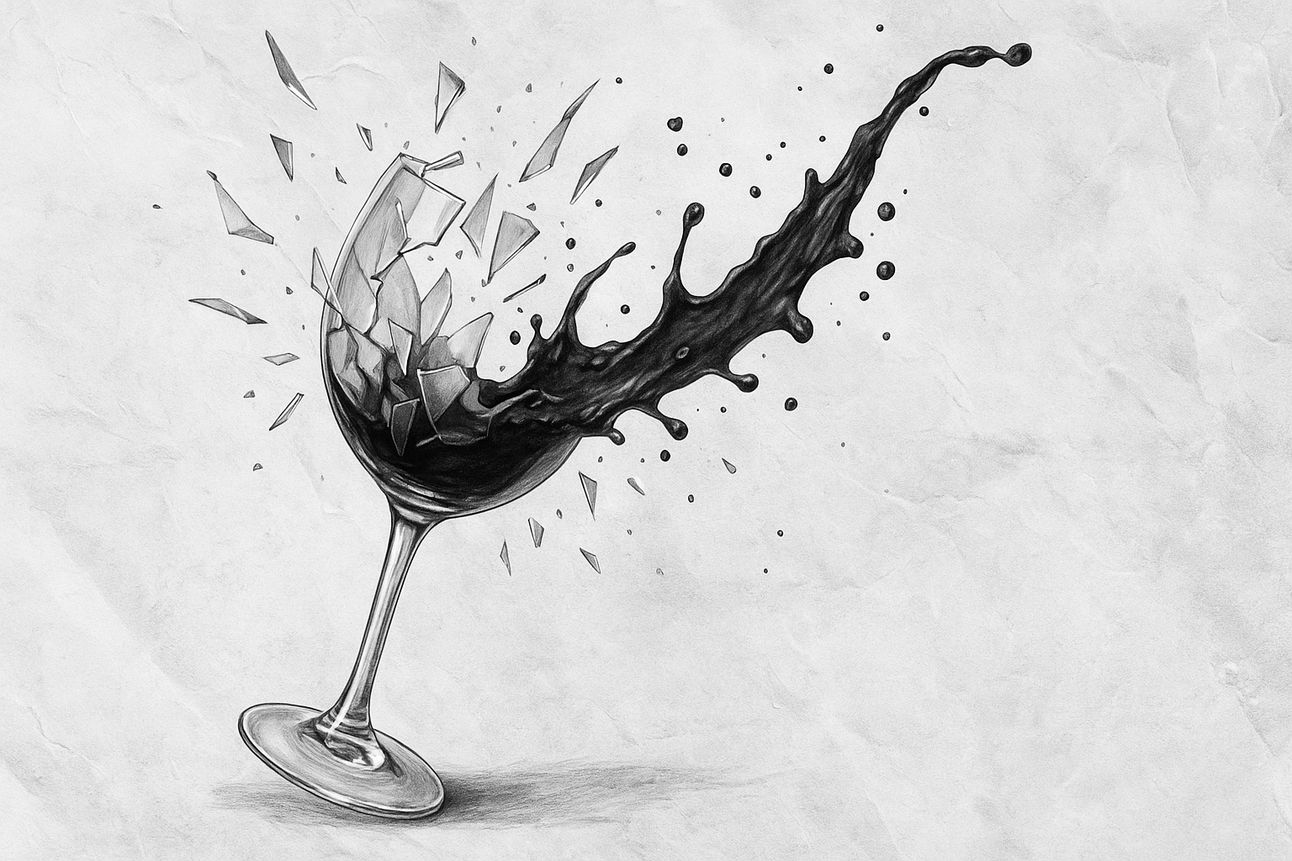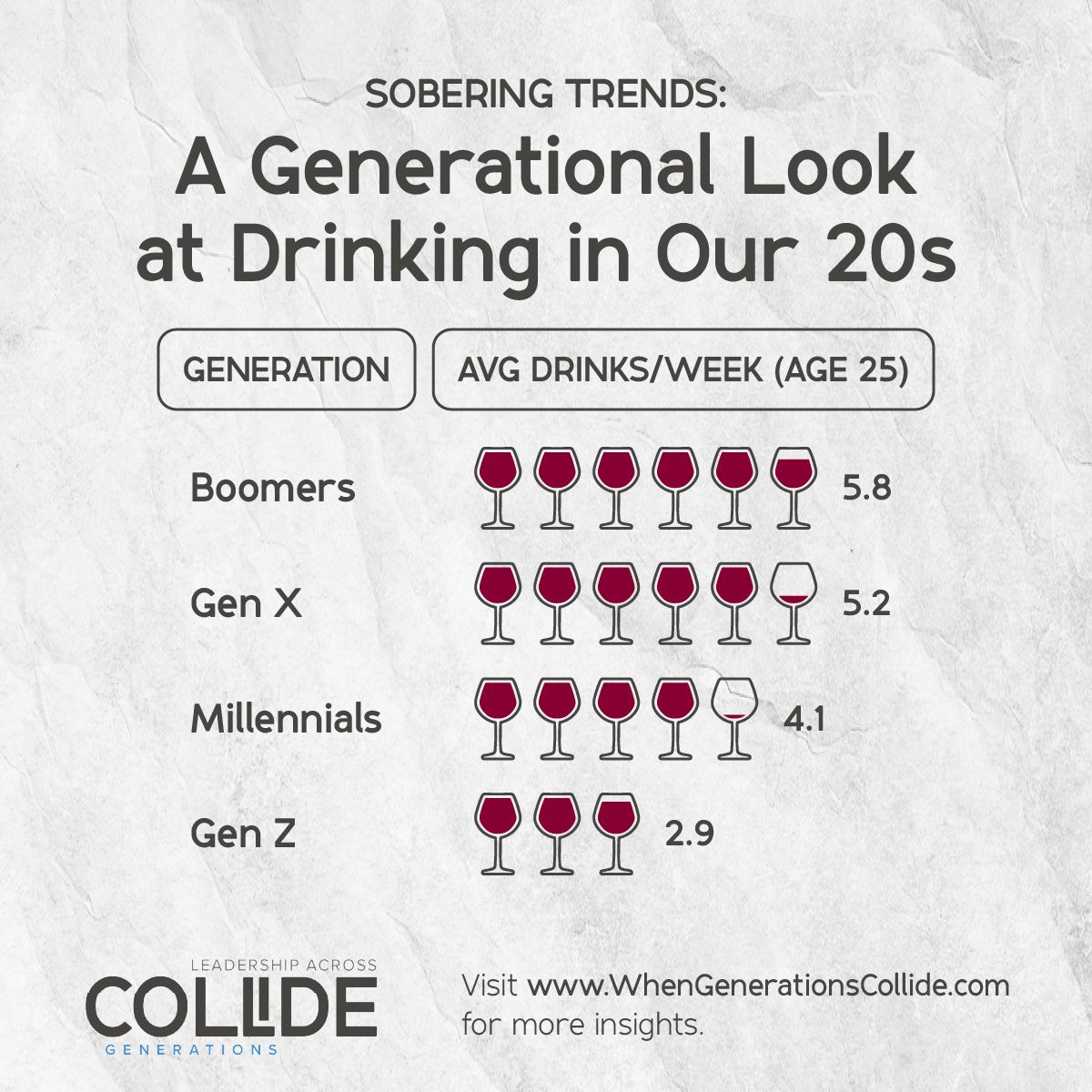- Collide - Generational Leadership
- Posts
- Gen Z's Sobriety Isn’t a Moral Movement. It’s a Market Signal.
Gen Z's Sobriety Isn’t a Moral Movement. It’s a Market Signal.
Gen Z's drinking habits reveal a deeper transformation in consumer values and social connection.

Every generation rebels in one way or another. Alcohol is one of the classic categories of rebellion…or is it? Boomers threw back Long Island Iced Teas. Now, Gen Z orders mocktails with electrolytes.
This isn’t about conservatism or morality but control, cost, and curation.
For decades, alcohol consumption was a rite of passage for American youth. It signaled freedom, social identity, even adulthood. But something fundamental is changing: Gen Z, the youngest generation of adults, is drinking less than any cohort in recent U.S. history (Pew Research Center, 2024; Gallup, 2023). And while pundits may be tempted to label this a “return to traditional values,” the reality is far more nuanced. This generational shift isn’t likely tied to a religious revival or a moral revolution. It’s a signal of evolving consumer habits, emotional priorities, and a redefinition of what it means to live well.
The Decline Is Real—and Intentional
Drinking (alcoholic beverages) is down across the board for Gen Z. The percentage of 18–34-year-olds who say they drink has fallen 10 percentage points in the last two decades, from 72% in the early 2000s to 62% today (Gallup, 2023). Binge drinking, which once defined youth culture, is also on the decline. Among 12th graders, only 24% reported binge drinking in the past two weeks in 2023, compared to 42% in 2001 (National Institute on Alcohol Abuse and Alcoholism [NIAAA], 2023). Arguably, this is a healthy and promising trend for our students.
It is important to note that approximately half of Gen Z is of legal drinking age in the USA. All Gen Z will be 21+ by the end of 2033.
Let me be clear: it’s not that Gen Z is refusing to go out for a night on the town. They are. But instead of blacking out to forget about their boss, they’re meeting up with friends to build something more lasting: joy, presence, and memory. And they’re doing it with sparkling water in hand…not because they’re being good, but because they’re being intentional.
📸 Generational Snapshot

Why They’re Drinking Less
1. Economic Pressure
Alcohol is expensive, not just in price but in opportunity cost. For a generation facing student debt, rising rent, and declining homeownership prospects, a $15 cocktail isn’t just a splurge; it’s a symbol of waste.
Households led by those under 25 now spend only 0.74% of their budgets on alcohol, lower than any other age group (The Rum Lab, 2023). By contrast, Boomers in their prime earning years helped fuel a wine boom, frequenting vineyards and wine clubs (Pew Research Center, 2022). Gen Z, however, is more likely to spend on wellness, experiences, or tech than on alcohol, especially when every dollar counts.
2. Health and Wellness First
The “sober curious” movement didn’t start with Gen Z, but they’ve embraced it with open arms. Alcohol is increasingly viewed as a health liability, not a social lubricant. The percentage of young adults (under 35) who say that having one to two drinks a day is unhealthy has jumped from 34% to 52% in just the past five years (Gallup, 2023). That’s higher than any other age group.
Unlike Boomers who grew up believing that a glass of red wine was heart-healthy, Gen Z has access to research, apps, and influencers warning of the risks alcohol poses to liver function, mental health, and even longevity. The result? A generation opting for kombucha, adaptogenic tonics (plant and mushroom-based remedies), or zero-proof cocktails in the name of focus and clarity.
3. Digital Self-Curation
It’s hard to go viral for the right reasons when you’re slurring your speech on Instagram Live. Gen Z knows this better than anyone.
As the first generation to grow up entirely online, Gen Z curates their digital identities with precision. Every moment is potentially captured, tagged, and distributed, so they drink accordingly. Not drinking, or drinking modestly, isn’t lame. It’s smart branding.
The social reward system has shifted. Being in control, looking good, and being mentally sharp now matters more than having a wild story no one remembers. Alcohol-induced embarrassment isn’t just personal—it’s public.

It's Not About Morality, It’s About Meaning
Yes, Gen Z drinks less. This isn’t driven by religious revival or a return to temperance-era values. Pew data shows that only about half of Gen Z adults identify as Christian—down sharply from prior generations (Pew Research Center, 2021). Even among Christians, only 15–16% of U.S. adults say drinking is morally wrong (Pew Research Center, 2022).
So why does their behavior mirror that of generations who lived through Prohibition?
Because today’s restraint is rooted in practicality, not piety. The Greatest Generation faced legal prohibition. Gen Z faces digital documentation, economic stress, and burnout culture. Different constraints—similar results.
The Bigger Picture: A Shift in Priorities
Here’s the real insight for business and brand leaders: alcohol is just the canary in the coal mine. Gen Z’s drinking habits reflect a deeper cultural pivot—away from escapism, toward intentionality.
They’re not retreating from social life. They’re redefining it. They don’t want to numb out. They want to tune in. A night out isn’t about forgetting the week—it’s about remembering the moment.
This has sweeping implications far beyond beverage marketing:
In the workplace, they’re less tolerant of toxic environments because they’re not self-medicating the aftermath.
In families, they’re more present, more vocal about boundaries, and less likely to passively accept inherited dysfunction.
In consumer behavior, they’re looking for products that enhance their lives, not dull them.
Final Thought: Read the Signal
If you're a business leader, marketer, or employer still using alcohol as your cultural shorthand for fun, celebration, or connection—it's time to reconsider. Gen Z is quietly rewriting the social script. What they want isn’t prohibition. It’s presence.
They’re not just avoiding hangovers. They’re architecting a different life—one that doesn’t require recovery.
And if you’re paying attention, that’s not a red flag. It’s a roadmap.
As always, thanks for reading! Feel free to reply with your thoughts,
Sincerely,

A special thanks to our sponsors who make this newsletter possible…
Keep more of what you earn
Collective is the first all-in-one financial solution exclusively for solopreneurs. Members save an average of $10,000 a year by optimizing their taxes via an S Corp.*
Membership includes:
LLC and S Corp formation
Payroll
Monthly bookkeeping
Quarterly tax estimates
Annual business tax filing
Access to a team of experts
Enjoy peace of mind while maximizing your profits, and enjoy extra time to focus on growing your business.
Use code SPRINGFREE at checkout and get your first month free!
*Based on the average 2022 tax savings of active Collective users with an S Corp tax election for the 2022 tax year
Start learning AI in 2025
Keeping up with AI is hard – we get it!
That’s why over 1M professionals read Superhuman AI to stay ahead.
Get daily AI news, tools, and tutorials
Learn new AI skills you can use at work in 3 mins a day
Become 10X more productive
Get a List of the Best HRIS Software for Your Company
Stop wasting time on endless research and confusing options.
Our HR Software experts provide you with tailored recommendations from our database of 1,000+ vendors across HRIS, ATS, Payroll, and HCM.
✅ 15 minutes vs. hours of demos
✅ 1:1 help from an HR Software expert
✅ No spam, no sales pressure
Works Cited
Gallup. (2023). U.S. alcohol consumption habits remain flat. Retrieved from https://news.gallup.com
National Institute on Alcohol Abuse and Alcoholism. (2023). Monitoring the Future Survey: Trends in alcohol use among youth. Retrieved from https://www.niaaa.nih.gov
Pew Research Center. (2021). The Future of Religion in America. Retrieved from https://www.pewresearch.org
Pew Research Center. (2022). America’s Changing Religious Landscape. Retrieved from https://www.pewresearch.org
Pew Research Center. (2024). Trends in alcohol and drug use by generation. Retrieved from https://www.pewresearch.org
The Rum Lab. (2023). Alcohol spending by age and generation. Retrieved from https://therumlab.com


Reply